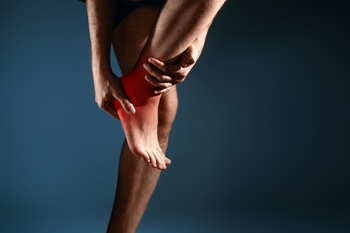Connect With Us
Blog
Items filtered by date: September 2021
Complications of Overly Sweaty Feet
 We all deal with foot sweat from time to time, but if you find that your feet are wet, clammy, or leaving soggy footprints on the floor, you may have plantar hyperhidrosis. Hyperhidrosis is a medical condition that causes excessive sweating. It can affect various parts of the body, but is particularly common in feet. Other than being annoying and possibly embarrassing, untreated plantar hyperhidrosis can have health consequences. Excessive sweating can make the feet perpetually moist, increasing the risk of fungal (athlete’s foot, toenail fungus), bacterial (folliculitis), and viral (warts caused by HPV) infections and skin breakdown. A heat rash, which causes itching, redness, and stinging, may also develop. If you are suffering from plantar hyperhidrosis, a podiatrist can help find the most effective treatment for you.
We all deal with foot sweat from time to time, but if you find that your feet are wet, clammy, or leaving soggy footprints on the floor, you may have plantar hyperhidrosis. Hyperhidrosis is a medical condition that causes excessive sweating. It can affect various parts of the body, but is particularly common in feet. Other than being annoying and possibly embarrassing, untreated plantar hyperhidrosis can have health consequences. Excessive sweating can make the feet perpetually moist, increasing the risk of fungal (athlete’s foot, toenail fungus), bacterial (folliculitis), and viral (warts caused by HPV) infections and skin breakdown. A heat rash, which causes itching, redness, and stinging, may also develop. If you are suffering from plantar hyperhidrosis, a podiatrist can help find the most effective treatment for you.
If you are suffering from hyperhidrosis contact one of our podiatrists of Lexington Foot and Ankle Center, PSC. Our doctors can provide the care you need to attend to all of your foot and ankle needs.
Hyperhidrosis of the Feet
Hyperhidrosis is a rare disorder that can cause people to have excessive sweating of their feet. This can usually occur all on its own without rigorous activity involved. People who suffer from hyperhidrosis may also experience sweaty palms.
Although it is said that sweating is a healthy process meant to cool down the body temperature and to maintain a proper internal temperature, hyperhidrosis may prove to be a huge hindrance on a person’s everyday life.
Plantar hyperhidrosis is considered to be the main form of hyperhidrosis. Secondary hyperhidrosis can refer to sweating that occurs in areas other than the feet or hands and armpits. Often this may be a sign of it being related to another medical condition such as menopause, hyperthyroidism and even Parkinson’s disease.
In order to alleviate this condition, it is important to see your doctor so that they may prescribe the necessary medications so that you can begin to live a normal life again. If this is left untreated, it is said that it will persist throughout an individual’s life.
A last resort approach would be surgery, but it is best to speak with your doctor to find out what may be the best treatment for you.
If you have any questions please feel free to contact our offices located in Harrodsburg, Frankfort, Georgetown, Lexington, and Flemingsburg, KY . We offer the newest diagnostic and treatment technologies for all your foot and ankle needs.
Should I See a Doctor for My Heel Pain?
 Heel pain is one of the most common conditions podiatrists help treat, and it can have a variety of causes. Common causes of heel pain include plantar fasciitis, Achilles tendonitis, bursitis, a ruptured Achilles tendon, or a heel fracture. There are a few key signs that your heel pain may be serious and needs to be checked by a podiatrist. If the pain continually worsens, stops you from doing daily activities, has not improved after a couple of weeks, or causes a tingling sensation in the heel, there may be a more serious issue at play that should be checked by a podiatrist. If the pain is severe, hinders your ability to walk, or was accompanied by a popping sensation at the time of injury, these may be signs of an even more serious injury that should be treated immediately.
Heel pain is one of the most common conditions podiatrists help treat, and it can have a variety of causes. Common causes of heel pain include plantar fasciitis, Achilles tendonitis, bursitis, a ruptured Achilles tendon, or a heel fracture. There are a few key signs that your heel pain may be serious and needs to be checked by a podiatrist. If the pain continually worsens, stops you from doing daily activities, has not improved after a couple of weeks, or causes a tingling sensation in the heel, there may be a more serious issue at play that should be checked by a podiatrist. If the pain is severe, hinders your ability to walk, or was accompanied by a popping sensation at the time of injury, these may be signs of an even more serious injury that should be treated immediately.
Many people suffer from bouts of heel pain. For more information, contact one of our podiatrists of Lexington Foot and Ankle Center, PSC. Our doctors can provide the care you need to keep you pain-free and on your feet.
Causes of Heel Pain
Heel pain is often associated with plantar fasciitis. The plantar fascia is a band of tissues that extends along the bottom of the foot. A rip or tear in this ligament can cause inflammation of the tissue.
Achilles tendonitis is another cause of heel pain. Inflammation of the Achilles tendon will cause pain from fractures and muscle tearing. Lack of flexibility is also another symptom.
Heel spurs are another cause of pain. When the tissues of the plantar fascia undergo a great deal of stress, it can lead to ligament separation from the heel bone, causing heel spurs.
Why Might Heel Pain Occur?
- Wearing ill-fitting shoes
- Wearing non-supportive shoes
- Weight change
- Excessive running
Treatments
Heel pain should be treated as soon as possible for immediate results. Keeping your feet in a stress-free environment will help. If you suffer from Achilles tendonitis or plantar fasciitis, applying ice will reduce the swelling. Stretching before an exercise like running will help the muscles. Using all these tips will help make heel pain a condition of the past.
If you have any questions please contact our offices located in Harrodsburg, Frankfort, Georgetown, Lexington, and Flemingsburg, KY . We offer the newest diagnostic and treatment technologies for all your foot and ankle needs.
It's Time for Beautiful Feet
Foot Pain Can Happen For Different Reasons
 Foot pain is a common ailment among many patients, and there are several reasons why this can occur. Foot sprains can cause severe pain and discomfort, and can happen as a result of tearing or overstretching the ligaments. Plantar fasciitis affects the heel and arch of the foot, and it can cause difficulty walking and completing daily activities. Some patients experience tarsal tunnel syndrome, and symptoms of this condition can consist of a tingling or numbing sensation in the bottom of the foot. Charcot arthropathy of the foot can cause the bones in the foot and ankle to weaken. Any type of foot pain requires a consultation with a podiatrist, who can effectively diagnose and treat your pain.
Foot pain is a common ailment among many patients, and there are several reasons why this can occur. Foot sprains can cause severe pain and discomfort, and can happen as a result of tearing or overstretching the ligaments. Plantar fasciitis affects the heel and arch of the foot, and it can cause difficulty walking and completing daily activities. Some patients experience tarsal tunnel syndrome, and symptoms of this condition can consist of a tingling or numbing sensation in the bottom of the foot. Charcot arthropathy of the foot can cause the bones in the foot and ankle to weaken. Any type of foot pain requires a consultation with a podiatrist, who can effectively diagnose and treat your pain.
Foot Pain
Foot pain can be extremely painful and debilitating. If you have a foot pain, consult with one of our podiatrists from Lexington Foot and Ankle Center, PSC. Our doctors will assess your condition and provide you with quality foot and ankle treatment.
Causes
Foot pain is a very broad condition that could be caused by one or more ailments. The most common include:
- Bunions
- Hammertoes
- Plantar Fasciitis
- Bone Spurs
- Corns
- Tarsal Tunnel Syndrome
- Ingrown Toenails
- Arthritis (such as Gout, Rheumatoid, and Osteoarthritis)
- Flat Feet
- Injury (from stress fractures, broken toe, foot, ankle, Achilles tendon ruptures, and sprains)
- And more
Diagnosis
To figure out the cause of foot pain, podiatrists utilize several different methods. This can range from simple visual inspections and sensation tests to X-rays and MRI scans. Prior medical history, family medical history, and any recent physical traumatic events will all be taken into consideration for a proper diagnosis.
Treatment
Treatment depends upon the cause of the foot pain. Whether it is resting, staying off the foot, or having surgery; podiatrists have a number of treatment options available for foot pain.
If you have any questions, please feel free to contact our offices located in Harrodsburg, Frankfort, Georgetown, Lexington, and Flemingsburg, KY . We offer the newest diagnostic and treatment technologies for all your foot care needs.
Who Should Get MTP Joint Replacement Surgery?
The metatarsophalangeal (MTP) joint connects the toes to the rest of the feet. The MTP joint that is located at the base of the big toe, in particular, is a frequent site of arthritis, stiffness, and deformity. Conservative treatments, such as doing foot stretching and strengthening exercises, taking anti-inflammatory medications, or injecting steroids into the joint, are sometimes effective for managing symptoms and reducing pain. However, severe symptoms that do not respond to conservative treatments may require surgical intervention. During a joint replacement surgery, the damaged MTP joint is replaced with a prosthetic. If you are suffering from MTP joint pain, please consult with a podiatrist, who can determine the right course of treatment for you.
In certain cases, in which the patient suffers from extreme pain or damage in a joint, joint replacement surgery may be deemed useful. If you have constant pain in a foot joint, consult with one of our podiatrists from Lexington Foot and Ankle Center, PSC. Our doctors will assess your condition and provide you with quality foot and ankle treatment.
What Is Joint Replacement Surgery?
Over time, joints wear down; this can be exacerbated by diseases and conditions. Joint replacement surgery, also known as arthroplasty, is when a damaged joint is surgically removed and replaced with a prosthesis. Prostheses, which can be made of ceramic, plastic, or metal, act as joints in lieu of an actual joint. One of the most prevalent causes for joint replacement is arthritis.
Arthritis in the Foot
Arthritis can occur in any joint in the body, including in the feet. Common types of arthritis in the foot are osteoarthritis, rheumatoid arthritis, and gout. The big toe is usually where arthritis occurs in the foot; this is known as hallux rigidus.
Joint Replacement Surgery in the Foot
The most common form of joint replacement in the foot is a first metatarsophalangeal (MTP) joint placement. MTP joint replacement surgery is designed to treat hallux rigidus. Surgery is not intensive, and recovery occurs within one to two months after the procedure has been done. Overall, joint replacement surgery is a safe and effective way to treat pain in the joint of the foot.
If you have any questions, please feel free to contact our offices located in Harrodsburg, Frankfort, Georgetown, Lexington, and Flemingsburg, KY . We offer the newest diagnostic and treatment technologies for all your foot care needs.


